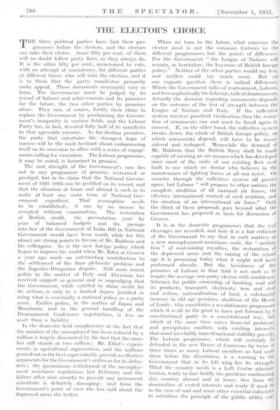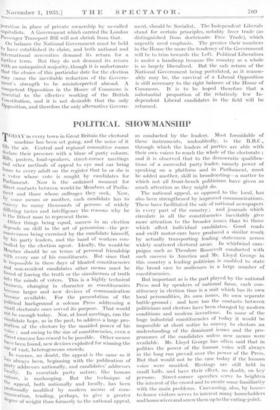THE ELECTOR'S CHOICE
THE three political parties have laid their pro- grammes before the electors, and the electors can take their choice. Some fifty percent. of them will no doubt follow party lines.; as they always do. It is the other fifty. per pent., accustomed to vote, with no attempt at consistency, for .different parties at different times, who will turn the election, and it is to them that the party manifestos primarily Make appeal. Those docuthents necessarily vary in form. The Government must be judged by its record of failures and achievements and its promises for the future, the two other parties by promises alone. They can, of course, fortify their claim to replace the Government by proclaiming the Govern- ment's incapacity in various fields, and the Labour Party has, in fact, devoted fully half of its manifesto to that agreeable exercise. As for election promises, the party that entertains the strongest hope of success will be the most hesitant about embarrassing itself on its accession to office with a series of engage- ments calling for execution. The Labour programme, it may be noted, is luxuriant in promise.
The real strength of the Government's case lies not in any programme of promise, restrained or prodigal, but in its claim that the National Govern- ment of 1931-1985 can be justified on its record, and that the situation at home and abroad is such as ,to make at least one more term of National Gov- ernment expedient. That assumption needs to be established ; it can by no means be accepted without examination. The restoration of 'British credit, the presentation . year by year Of balanced budgets and the passage into law of the Government of India Bill (a National Government would have been worth while for this alone) are strong points in favour of Mr. Baldwin and his colleagues. So is the new foreign policy which began to impress the world when Mr. Eden at Geneva a year ago made an outstanding contribution to the settlement of the Saar plebiscite problem and the Jugoslav-Hungarian dispute. Still more recent policy in the matter of Italy and Abyssinia has received support so general and so ungrudging that the Government, while entitled to claim credit for its actions, is only to .a limited degree justified in using what is essentially a national policy as a party asset. Earlier policy, in the matter of Japan and Manchuria, and in the general handling of the Disarmament Conference negotiations, is less an asset than a liability.
In the domestic field complacency at the fact that the number of the unemployed has been reduced by a million is largely discounted by the fact that the num- ber still stands at two milliOn ; Mr. Elliot's experi- ments in agriCultural organisation, and the millions poured out on the beet sugar subsidy, provide as effective arguments Tor the Government's critics as for its defen- ders ; the ignominious withdrawal of the unemploy- ment 'assistance, regulations last February and the failure after nine months to provide any permanent substitute is definitely damaging ; and from the Government's point of view the less said abOut the depressed areas the better. When we turn to the future, what concerns the elector most is not the common features in the different programmes, but the points of difference. For the Government " the League of Nations will reinain, as heretofore, the keystone of British foreigP. policy." Neither of the .other parties would say less, and neither could say much more. But on one cognate question, :there is radical difference. Where the Government talks of rearmament, Labour, and less emphatically the Liberals, talk of disarmament. Actually the decision regarding armaments depends on the outcome of the test of strength between the League of Nations and Italy. If the collective system receives practical vindication, then the reduc- tion of armaments can and must be faced again in earnest. If, on the other hand, the collective system breaks down, the whole of British foreign policy, on which armaments depend, will have to be recon- sidered and reshaped. Meanwhile the demand of Mr. Baldwin that the British Navy shall be made capable of meeting an air menace which has developed since most of the units of our existing fleet • were built is one which no elector who believes in the maintenance of fighting forces at all can resist. On security through the collective system all parties agree, bid Labour " will propose to other nations the complete abolition of all national air forces, the effective international control of civil aviation, and the creation of an international air force." only the third of these proposals goes beyond what the Government has proposed as basis for discussion at Geneva.
It is in the domestic programmes that the rad. cleavages are revealed, and here it is a fair criticism of the, Government to say that in such matters as a new unemployment-assistance scale, the " unifies' tion " of coal-mining royalties, the restoration of the depressed areas and the raising of the school age it is promising today what it might well have performed already. But the lavishness of the promises of Labour in that field is not such as to inspire the average non-party elector with confidence. Schemes for public ownership of banking, coal and its products, transport, electricity, iron and steel and cotton, nationalisation of land, a substantial. increase in old age pensions, abolition of the House' of Lords—this constitutes a revolutionary progra runic which it is all to the good to have put forward by 3 constitutional party in a constitutional' way, but which at the same time raises financial problen and precipitates conflicts with existing .interests, that must inevitably imperil national stability graver'. The Labour programme, which will certainly be defended in the new House of Commons by twice or three times as many Labour members as . had seats there before the dissolution, is a warning to the Government that in its left wing lies its strength' What the country needs is a Left Centre adminis- tration, ready to face boldly the problems confronting this country abroad and at home, free from the domination of vested interests and ready if need be in the case of coal and some other essential industries to introduce the principle of the pUblic utility coy Poration in place of private ownership by so-called capitalists. A Government which carried the London passenger Transport Bill will not shrink from that.. On .balance the National Government must be held to have established its claim, and both national and International necessities demand its return for a further term. But they do not demand its return With an unimpaired majority, though it is unfortunate that the choice of this particular date for the election 'IAN' cause the inevitable reduction of the Govern- '1 ent's strength to be misinterpreted abroad. A competent Opposition in the House of Commons is essential to the effective working of the British Constitution, and it is not desirable that the only Opposition, and therefore the only alternative Govern- ment, should be Socialist.„ The Independent Liberals Stand for certain principles, notably freer trade (as distinguished from doctrinaire Free Trade), which urgently need emphasis. The greater their numbers in the House the more the tendency of the Government will be to trim towards the Left. Political Liberalism is under a handicap because the country as a whole is so largely liberalised. But the safe return of the National Government being postulated, as it reason- ably may be, the survival of a Liberal Opposition is still necessary to the right balance of the House of Commons. It is to be hoped therefore that a substantial proportion of the relatively few In- dependent Liberal candidates in the field will be returned.



























































 Previous page
Previous page